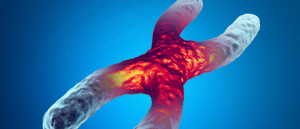Why do we gain weight as we age?

Is it all in the metabolism? A recent study reveals surprising results about the stages at which the human metabolism changes.
Age begets many changes in the human body: hairlines recede, bones become weaker and skin more delicate. One of these changes, perhaps the most well documented throughout middle age, includes a reduced rate of metabolism leading to an increased gain of weight. However, recent research highlights that this change in metabolism may not be occurring as we expect.
A huge international collaboration of researchers from 29 countries has refuted the theory that the weight gain so often observed during someone’s 30s or 40s is largely due to their reduced metabolism. Analyzing data from a combined 6600 people ranging in age from week-old infants to 95-year-olds, the team were able to overcome a key challenge associated with studying metabolism.
The malaise of metabolism studies
Typical studies of metabolism either measured the basal metabolic rate – accounting for the energy expenditure involved to keep a body alive but no more – or used an incredibly costly urine test that requires participants to drink doubly labeled water, before measuring how quickly it is released to measure total daily energy expenditure. Doubly labeled water is composed of heavier isotopes of oxygen and hydrogen and is very expensive, limiting the scale of experiments involving it.
By pooling their doubly labeled water experiments, the researchers were able to analyze a far greater dataset then they ever would have achieved individually. Initial findings were perhaps not so staggering: infants had the highest energy requirements relative to size, with the average 1-year-old burning 50% more calories per pound than an adult.
 Does junk DNA hold the key to aging?
Does junk DNA hold the key to aging?
In normal cells, telomeres shorten with successive rounds of DNA duplication and cell division, and eventually, the telomeres become so short that the cells can no longer reproduce, causing them to age and die.
The caloric fountain of youth
While this may seem obvious due to the rapid growth and development occurring during youth, first author Herman Pontzer (Duke University, NC, USA) noted that:
“Of course, they’re growing, but even once you control for that, their energy expenditures are rocketing up higher than you’d expect for their body size and composition. Something is happening inside a baby’s cells to make them more active, and we don’t know what those processes are yet.”
More surprising was the fact that after this initial high point, total daily energy expenditure – when adjusted for fat-free mass – decreased at a slow continuous rate, all the way through puberty, until the age of 20, where it plateaued for 40 years until 60. This staggered the researchers who had largely suspected that puberty would have a large influence on metabolism and energy expenditure.
60 is the new 40
The length of this plateau also contradicts the colloquial wisdom that after 40, keeping the weight off is an uphill battle against your metabolism. In fact, even when the metabolism does begin to decline again, it is a gradual change falling by 0.7% a year.
Again, it may seem clear that this change may be induced by the characteristic muscle atrophy that accompanies the later stages of aging, but Pontzer revealed that the team had “controlled for muscle mass,” claiming that the decrease was due to the fact that “their cells are slowing down.” Accounting for varying physical activity failed to disrupt the trends.
Commenting on the peculiar nature of the findings Pontzer stated: “There are lots of physiological changes that come with growing up and getting older. Think puberty, menopause, other phases of life. What’s weird is that the timing of our ‘metabolic life stages’ doesn’t seem to match those typical milestones.”
Drawing a conclusion from these musings, Pontzer hypothesized that, “All of this points to the conclusion that tissue metabolism, the work that the cells are doing, is changing over the course of the lifespan in ways we haven’t fully appreciated before. You really need a big data set like this to get at those questions.”





